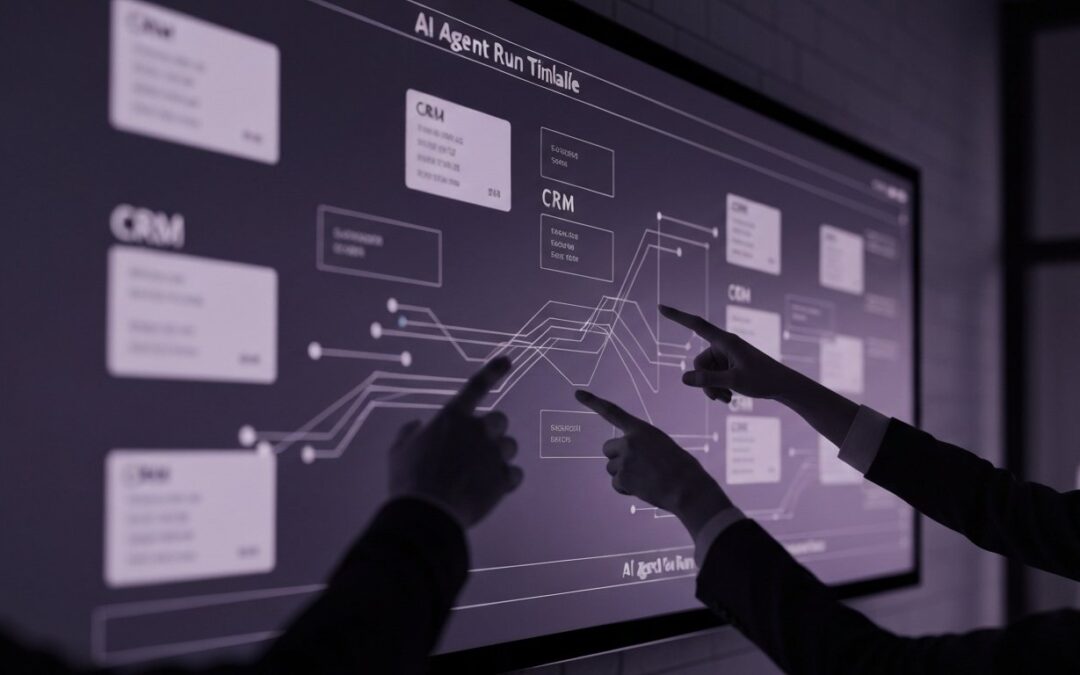The Emergence of AI in Healthcare Guidance
The healthcare field has witnessed remarkable changes over the past decade, with artificial intelligence (AI) agents emerging as vital tools to speed up access to critical information. In today’s fast-paced world, every second counts, especially when healthcare professionals need the most accurate and current guidelines. AI agents not only support decision-making but also reduce the time required to sift through traditional lengthy documents. As one top healthcare administrator noted, “Innovative AI technology is transforming how we interact with medical guidelines, making lifesaving information available in seconds.” This article explores the intricacies of using AI agents to access healthcare guidelines rapidly, comparing traditional search methods with AI-driven approaches. It will also provide practical steps to adopt these advanced tools so that you can quickly integrate them into your daily practice with confidence. Along this journey, we will discuss the overall benefits, potential pitfalls, and future advancements in this transformative technology. If you have ever felt frustrated while trying to locate the right guideline at a critical moment, then this guide promises to be an essential resource.
How AI Agents Revolutionize Healthcare Guideline Access
Artificial intelligence agents have made it possible to extract and present complex healthcare guidelines in a simple, user-friendly manner. Unlike conventional databases with static content that can be challenging to navigate, AI agents use natural language processing to understand user queries. They are designed to filter through thousands of documents and present the most relevant information in seconds. In many respects, these agents embody the phrase “cutting through the noise,” easing the burden on healthcare professionals who need quick, reliable guidance. Furthermore, AI systems can learn and adapt over time, improving the accuracy and efficiency of the information they access. Their capacity to integrate with online databases and internal hospital systems makes them an indispensable asset in a dynamic, unpredictable healthcare environment. Healthcare workers and patients alike can now benefit from speedy, secure, and precise answers. Retaining this level of accuracy is no easy feat, yet many developers and researchers have managed to combine state-of-the-art algorithms with deep medical expertise to achieve exactly that.
The Traditional Approach Versus AI-Driven Solutions
Traditional methods of searching for healthcare guidelines entail manually combing through digital files or consulting outdated printed resources. Many healthcare professionals have encountered the frustration of endless scrolling and irrelevant search results when using these methods. In contrast, AI-driven solutions leverage advanced algorithms and machine learning to dynamically present the necessary recommendations. Below is a comparison table outlining the key differences between traditional methods and AI-powered agents:
| Criteria | Traditional Search | AI Agent-Based Search |
|---|---|---|
| Speed | Slow and time-consuming | Rapid, real-time response |
| Accuracy | Varies widely | Consistently high accuracy |
| Adaptability | Limited updates | Continuously learns |
| Integration | Standalone resources | Seamless system integration |
| User Experience | Cumbersome | User-friendly, interactive |
This table clearly shows the overwhelming advantages that AI agents have in making healthcare guidelines more accessible and actionable. Technology that once seemed to belong exclusively in sci-fi films is now at our fingertips, driving real-world improvements in patient care. Healthcare professionals now have the opportunity to use these innovative tools to support their work, ensuring that they always have the most up-to-date guidelines on hand. Whether in a busy hospital during a crisis or a quiet private practice seeking the latest protocol updates, AI agents are proving to be a game changer across the board. They make the guideline-seeking process a breeze and help cut down on critical delays that could potentially affect patient outcomes.
Step-by-Step Guide to Using AI Agents for Swift Guideline Access
Accessing healthcare guidelines using AI agents is not rocket science. With a clear roadmap, even newcomers can start benefiting from these advanced solutions. Follow these simple steps to get up and running:
- Identify the Right AI Tool: Start by researching the various AI platforms available. Look for tools that are specifically designed for healthcare applications. Reliability and security are critical, so choose an agent with a proven track record. It might be helpful to compare a few options side by side.
- Integration with Existing Systems: The selected AI tool should seamlessly integrate with your current healthcare systems. Check if it supports data exchange with your electronic health record (EHR) system. The easier it is to integrate, the more beneficial the tool will be in critical scenarios.
- Tailoring Guidelines Searches: Fine-tune the settings of your AI agent for your specific needs. Configure the search parameters so that the most relevant guidelines are prioritized. Some agents even allow you to set up automated alerts for guideline updates, ensuring you are always in the know.
- Training and Customization: Once the system is in place, invest time in training. Many AI tools offer tutorials and customer training sessions. Make sure the entire team is familiar with the platform and understands its full range of features.
- Test and Validate: Before deploying the system in real-time clinical settings, test it thoroughly. Validate that the responses are accurate and the user interface is easy to navigate. Feedback from trial runs is essential to iron out any wrinkles.
- Stay Updated: Finally, ensure that the tool is updated regularly to incorporate the latest developments and guidelines. Regular updates are key to maintaining the high level of service that modern healthcare demands.
These steps provide a clear framework for integrating an AI agent into your workflow. Whether you are managing a large hospital network or a small clinic, the system can be customized to meet your specific needs while significantly reducing the time spent searching for vital information.
Unpacking the Benefits of AI Agents for Healthcare Professionals
Leveraging AI agents for accessing healthcare guidelines carries numerous benefits, many of which have a direct impact on patient outcomes. One clear advantage is the reduction in research time. Instead of navigating through complicated digital libraries, healthcare providers receive precise, easily accessible answers within seconds. This reduction is not just about efficiency; it also enhances the quality of care offered. With more time available, medical professionals can focus on personalized patient care. Moreover, the tools are designed to deliver guidelines based on the latest research, ensuring that the advice provided is both current and evidence-based.
Another significant benefit is that AI agents can work around the clock. The healthcare system often deals with emergencies at odd hours, and having a reliable source of updated information available 24/7 is invaluable. The system continuously updates its knowledge base, taking advantage of real-time data and the latest medical breakthroughs. The technology helps ensure that no matter when a consultation is needed, the healthcare provider has access to the most accurate and up-to-date guidelines. “It feels like having a dedicated assistant who never sleeps,” remarked one long-time practitioner who has integrated AI into her daily routine. This sentiment resonates with many healthcare workers who now enjoy more time for critical thinking and patient-related tasks without being bogged down by administrative delays.
Furthermore, AI agents offer an unparalleled level of consistency. They eliminate the risk of human error in data retrieval, delivering uniform guidance every time. The rapid response time and accuracy of these agents instill a firmly rooted trust in the technology. The continuous evolution of AI means that the learning curve will only get smoother, providing even greater benefits as time passes. Adopting this technology is not just an upgrade; it is a revolution in healthcare management that promises to further enhance both efficiency and patient care standards.
Detailed Comparison: Traditional vs. AI-Enhanced Access
To appreciate the fast-paced benefits of AI agents more clearly, consider the differences expressed in these crucial areas:
- Response Time: Traditional search methods can often take minutes or even hours to locate a specific health guideline, while AI agents do it in seconds. The rapid response time significantly reduces the likelihood of delays in urgent healthcare scenarios.
- Reliability and Accuracy: Traditional methods are prone to missed updates and human oversight. AI agents, with their ability to cross-reference thousands of sources, have a built-in advantage ensuring higher reliability.
- User-Friendly Interface: Conventional databases may have complex navigation systems that confuse users, while AI agents provide an intuitive conversational style. This makes it easier for professionals to ask for guidelines and get instant feedback.
- Continuous Learning Curve: Unlike static sources that require manual updates, AI agents constantly learn from new data, ensuring that the guidelines provided are up-to-date and reflect the latest research findings.
With these insights in mind, it becomes clear that relying on outdated methods may no longer be the best approach when modern AI-driven solutions are available. The benefits of speed, accuracy, and ease of use are too significant to ignore. If you are keen on staying ahead in the fast-evolving field of healthcare, adapting to AI systems for quick guideline access constitutes a smart and strategic move. Furthermore, by embracing this technology, healthcare institutions can significantly improve patient outcomes while streamlining various operational processes.
AI Agents in Action: Real-World Applications and Case Studies
Imagine a scenario in a busy urban hospital where a sudden outbreak requires immediate access to recent treatment guidelines. Traditionally, staff might have had to search through bulky manuals or log into an outdated database. With an AI agent, one can simply ask, “What are the latest guidelines for managing respiratory distress in adults?” almost as if chatting with a colleague. A case study from a major healthcare network revealed that after integrating an AI system, the average time to retrieve important guidelines dropped by more than 75%. The reduction in search time directly contributed to improved patient care and safety. One hospital administrator commented, “It was like discovering a secret weapon. With instant access to essential guidelines, our staff felt empowered and incredibly confident in their decisions.” This example highlights how AI agents not only accelerate processes but also build trust among medical professionals. Such success stories are increasingly common as AI technology takes root in healthcare institutions across the globe.
Moreover, AI-driven systems have been used in remote and underserved areas, where resources are often limited. In these settings, rapid access to updated, evidence-based medical guidelines has proven to be a literal lifesaver. From telemedicine consultations in rural clinics to emergency responses in disaster-hit areas, AI agents provide a uniform level of support regardless of location. Reputable platforms like the World Health Organization and the Centers for Disease Control and Prevention validate the critical information being exchanged. These real-world applications underscore the significant role that AI agents play in modern healthcare. They not only bridge the gap between the latest research and frontline practice but also ensure that no one is left in the dark when speed and precision are key.
Practical Tip: How to Get Started with an AI Agent Today
If you are curious about harnessing AI to access healthcare guidelines quickly, the process is easier than you might think. First, gauge the specific needs of your practice or institution. Create a checklist of must-have features, such as real-time updates, compatibility with existing systems, ease of use, and robust security measures. Next, explore available platforms and read comprehensive user reviews. Look out for demos and trial versions to test functionality before making a final decision. Once you have chosen your AI agent, engage in any offered training sessions and do not hesitate to ask questions. Most providers offer a wealth of resources, including video tutorials, step-by-step guides, and direct customer support. By investing a little time initially, you ensure that the tool will seamlessly integrate with your daily workflow. This proactive approach not only upgrades your technological arsenal but also enhances patient care by reducing delays during critical moments.
Here’s a quick checklist for kickstarting your AI journey:
- Research and select an AI platform focused on healthcare.
- Verify integration compatibility with your current systems.
- Test out a demo version to gauge user-friendliness.
- Invest time in hands-on training and customization.
- Set up scheduled updates and alerts for new guidelines.
The process is simple yet effective, and countless health professionals have reported a significant boost in both confidence and performance after adopting AI agents. These agents are not merely technological upgrades; they are valuable partners that help manage the ever-changing landscape of medical guidelines. It goes without saying that by taking the leap now, you prepare your practice for a future where AI is not just an option but a necessity.
Overcoming Challenges When Using AI Agents
No technology comes without its challenges, and AI agents are no exception. One common roadblock is the initial complexity during the setup phase. It might take some time to configure the system and train your team effectively. However, the learning curve is well worth the improved efficiency in the long run. Sometimes there is concern about data security or privacy issues, but most reputable platforms implement stringent security protocols that comply with healthcare regulations such as HIPAA. Another potential hurdle is ensuring that the AI continues to learn and adapt to the latest research, a process that requires dedicated maintenance. Nevertheless, these obstacles can be overcome by partnering with experienced vendors and continuously training your staff on best practices. Healthcare organizations that diligently address these challenges often experience remarkable improvements in both workflow and patient care.
Moreover, skepticism from staff who are accustomed to traditional methods may also arise. Establishing trust takes time, but sharing success stories and measurable improvements, like the rapid retrieval times and increased guideline accuracy, can help alleviate concerns. At its heart, the purpose of using AI agents is to enhance rather than replace human expertise. It is a tool designed to support clinicians by providing lightning-fast, reliable access to the necessary guidelines. This collaborative approach between human judgment and advanced technology sets the stage for a more robust healthcare system, where every life-saving decision is well-informed.
The Future of Healthcare Guidelines Access
The future is bright for AI agents in healthcare. With continual advancements in machine learning and real-time data integration, the gap between medical research and clinical practice is rapidly diminishing. In the coming years, we can expect more sophisticated systems that offer even deeper insights, personalized recommendations, and predictive analytics. Imagine an AI agent that not only retrieves guidelines but also suggests potential treatment options based on the patient’s unique medical history. As the technology evolves further, such capabilities may become standard practice, revolutionizing the way healthcare providers approach treatment decisions. One leading expert in medical informatics recently stated, “We are on the brink of a revolution where AI will bridge the divide between complex research data and practical, actionable healthcare.” Such visionary ideas are no longer the stuff of science fiction; they are quickly becoming reality. Staying ahead of the curve means embracing these innovations now, which ultimately means better patient care and a more efficient healthcare system overall.
Embracing the Technology: A Final Word
Harnessing the power of AI agents to access healthcare guidelines is more than just a technological upgrade; it is a strategic move towards enhancing efficiency and improving patient outcomes. The transition from traditional methods to AI-driven processes is not without its own challenges, but the enormous benefits make it a worthwhile endeavor. By saving precious time, increasing the accuracy of guideline retrieval, and providing a user-friendly interface, these tools are reshaping the landscape of healthcare information management. Early adopters of AI agents find themselves at the forefront of a movement that significantly elevates the standard of care. As you consider your next steps, remember that transitioning to an AI-based system is like trading in an old car for a high-performance vehicle – once you experience the speed and reliability, there is no going back.
For healthcare professionals ready to embrace the future, the steps are clear. Identify your needs, invest in a robust platform, train your team, and continuously update the system for continued success. Whether you work in a bustling hospital or manage a small clinic, these AI agents are designed to meet your individual requirements. With an intuitive approach and the support of advanced technology, you are poised to transform everyday operations. Investing in AI-powered guideline retrieval is not just a trend; it is a bona fide necessity that promises to seriously elevate the standards of care and operational excellence in healthcare.
Before you sign off, be sure to check out resources available on healthcare.gov, the World Health Organization, and the Centers for Disease Control and Prevention for further reading and guidance on how technology is revolutionizing healthcare.
Learn more about advanced AI solutions on our home page.






